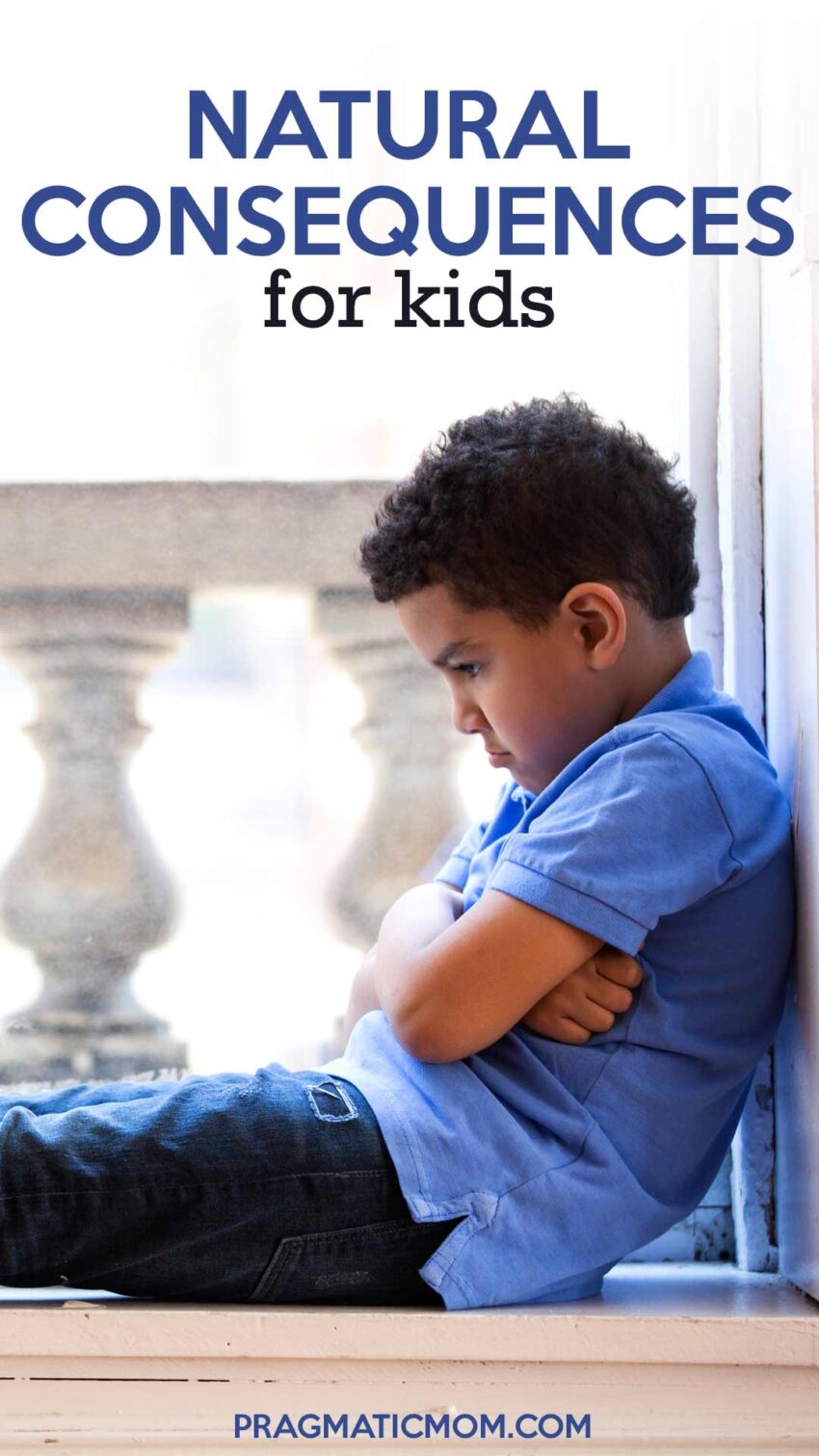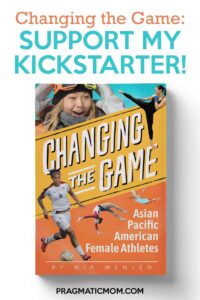My thanks to Faigie Kobre for returning with a much anticipated post on natural consequences for kids!
—————-
A couple of weeks ago I wrote a post for PragmaticMom on self esteem for children. I discussed four points that are crucial to helping your children develop good self esteem. One of the four points was consistent discipline. I also wrote under the heading of consistent discipline that punishment should be through natural consequences and since there was an interest in that topic, Mia asked me to write a follow up post addressing natural consequences.
Are natural consequences enough in disciplining children?
There are a lot of words bandied about when it comes to discipline. There is authoritarian parenting, permissive parenting, natural consequences, and logical consequences (among others). Natural consequences are indeed a wonderful way of parenting but, is natural consequences enough of a method in disciplining your children?
The short answer is probably not.
There was a very well-known psychologist years ago, named Rudolph Dreikurs. He wrote a book that I read on natural and logical consequences. He was a big believer in natural consequences. However, when I found the link to his book on Amazon, I saw that his book is updated and is now called The New Approach to Discipline: Logical Consequences
The New Approach to Discipline: Logical Consequences by Rudolf Dreikurs
This means that he realized that natural consequences can only go so far, but logical consequences fit most situations.
What are natural consequences and why aren’t they enough?
Natural consequences are, in a nutshell, dealing with the consequence of your behavior without anyone stepping in to save you.
- If you leave you’re toys out in the rain and they get lost or damaged … there go the toys and they will not be replaced.
- If you don’t put your clothing in the hamper or laundry, you will have no clean clothes.
- If you forget your lunch or snack at home, you will have nothing to eat in school.
These are just some of the scenarios where you can easily see the outcome of natural consequences.
However, one of two things ends up happening with these scenarios.
Parents often, cannot follow through on these natural consequences. They buy their children new toys when the toys get lost or stolen due to negligence on the child’s part. They will bring them lunch, snacks, and homework to school when it gets left at home. They clean up after their kids because they can’t take the mess or their children not having clean clothes.
On the opposite spectrum, there are parents that are determined to follow through on natural consequences without making exceptions and the consequences can become punitive. This becomes counterproductive as the children end up developing anger towards their parents and don’t learn the lesson they are supposed to.
For natural consequences to work well, it has to be “natural”.
For example:
- If your child forgets his homework and is going to get in trouble for not having it but, you are at work and there is no way you can get it to him, then he may very well remember it the next day. (Especially if he gets in trouble for not having it!)
- Or if your child is in a summer camp and is responsible for washing his/her own clothing and they leave their clothing all over the place then they get to see that if they don’t do their laundry they will have no clean clothes.
These are natural consequences.
In order for natural consequences to work, they need to be nonpunitive and truly natural.
What’s second best to natural consequences?
So if you can’t do natural consequences what is second best?
What is second best is logical consequences. These are consequences that the child knows will happen if such and such behavior is acted upon. They are called logical because they are a logical sequence to what will happen if they act out in certain ways. They make sense to you and to your child.
Logical consequences need to be paired up with firm limits. Children first must know their limits and what will happen if they cross those limits. One of the most important caveats, however, about dealing with firm limits and logical consequences is that they must be done without anger.
Many years ago I read a book called Why Good Parents Have Bad Kids (an excellent book).
Why Good Parents Have Bad Kids: How to Make Sure That Your Child Grows Up Right by E. Kent Hayes
This book highlights the methods used within a group home for children who came from highly dysfunctional and abusive homes. A couple was hired to recreate a normal, loving home environment to stand in for the parenting these children never received.
The main criteria when choosing this couple to be the house parents was that they could have no anger. People with no anger (very hard to find) means that they were able to deal with any kind of behavior from these traumatized children without reaction in anger.
This was the only way the children could heal. By being a rock to the children’s anger and not reacting to it helped them heal. It is one of the most therapeutic things you can do for angry kids.
Imagine if we could train ourselves not to react in anger to our children’s misbehavior. What a gift we would give them. (I know it’s very difficult but, a goal worth working towards!)
This is no way that children should not be given firm limits, but they have to be given the right way.
When my oldest was young I bought the book Setting Limits with Your Strong-Willed Child.
Setting Limits with Your Strong-Willed Child: Eliminating Conflict by Establishing Clear, Firm, and Respectful Boundaries by Robert J. Mac Kenzie
The funny thing was that when I read it wasn’t called for your strong-willed child, it was just Setting Limits for Children. I guess Mr. Mackenzie realized that kids that don’t have strong wills don’t need so much limit setting … or else he realized that strong-willed children are a special niche (and boy! are they ever) and renamed it accordingly.
I used that book religiously. When I was learning how to set limits with my oldest, a difficult child, I would run into my bedroom when she would act out, and quickly turn to the page on practical applications. This is just proof that one can change with enough will and determination.
What are the main points of Logical Consequences?
There are a few things that make logical consequences successful. For them to be so, they need to be…
- Immediate
- Consistent
- Related to the misbehavior
- Use acceptable role modeling
- Realistic time limits
- If they are not immediate then you and the children can forget why and what the consequences are. The consequences will then not be effective.
- The consequences must be carried out consistently or your children will learn what they can get away with.
- If the consequences are not related to the action then it is not a consequence, it is a punishment.
- You must use acceptable role modeling which will help the child learn for the future. And of course, non-anger is the best role modeling.
- When you put a 6 yr old child for a time out for an hour or even more, he or she will tend to forget what they are in for and it loses its potency. Time limits do not have to be for long. Longer timeouts fall into the punitive range.
When I was a new teacher many, many years ago I had a woman come to mentor me from the Board of Jewish Education. I had no idea how to discipline or get the kids to listen to me. She taught me how to give a child a time out while I was holding him even just for minute or two. The point was that I held him and this put ME in control. Even though I couldn’t get him to sit for a time out, when I held him for a short period, though it was for a very short time, I was the one to let him go and tell him that his time was up.
The point is that the children have to see that you are the one in control. Just make sure that you use your control judiciously. Choose your battles wisely as not everything needs a consequence and we have to also know when to let things go.
I hope you can now see why natural consequences cannot be the only trick in the book to disciplining our children. We must use a combination of firm limits, logical and natural consequences altogether.
Read the books I suggested above as I’m sure they will help you as much as they helped me. (and don’t forget the 1,2,3 Magic that I suggested in the self-esteem post.)
1-2-3 Magic: Effective Discipline for Children 2-12 by Thomas W. Phelan
I am sure if you use these consequences wisely you will, as a natural consequence have happy, self-assured, confident children.
Faigie Kobre is a Mom of 6 and Grandma of 4 (so far) and a former early childhood teacher and director. She owns the website Edu Art 4 Kids. In it, she teaches parents and teachers how to give kids art that makes them better learners, enhances their self-esteem, and gets them to have initiative. If you want to understand why typical crafts for kids can undermine these skills then go get her free reports on this topic.
p.s. Related posts:
Parenting With Purpose from Sleeping Should Be Easy
To examine any book more closely at Amazon, please click on image of book.
As an Amazon Associate, I earn from qualifying purchases.
BEST #OWNVOICES CHILDREN’S BOOKS: My Favorite Diversity Books for Kids Ages 1-12 is a book that I created to highlight books written by authors who share the same marginalized identity as the characters in their books.














Clear, informative excellent guide for parents. Now if only parents would come together, sit down, discuss and follow through….that is the tough part!
Yes Barbara follow through is ALWAYS the hard part.
Hi Faigie,
My husband or I cave on the follow through I’ve just realized. Every Single Time!
Hi Barbara,
Ah yes, the execution. That’s the hard part!
I’m a huge fan of natural consequences. Logical consequences are definitely second-best, but I’ve learned that sometimes I need to give myself some time to come up with a logical consequence!
Maryann I’d love to hear how some of your natural consequences have worked out. I have personally found that logical consequences work better for me but, it’s always good to hear which natural consequences actually worked.
I find that natural consequences work best in parenting when the stakes are low. I use creative activities with my kids partly to help them learn natural consequences – if they slice into a favorite slice of fabric and it goes wrong, that’s their fabric gone. At the same time, if they are afraid of starting a project, their fabric gets wasted in an entirely different way.
As far as discipline, I have had lots of success with my kids facing natural consequences for not doing school work and not getting ready for school in time. And then I feel that, when everything is working ideally, natural and logical consequences overlap – such as when kids lose a toy that is being fought over. Does that make sense to you?
The truth is that natural and logical often overlap. I remember when one of my kids (who is 25 now) was about 3 he was in a local playgroup. He was refusing to get dressed daily and I told him that when his carpool came if he wasn’t dressed he would have to go in his pajamas. I sent him in his pajamas and it never happened again but is that natural or logical?
That is exactly what I mean!
I like the end result and it’s not that punitive either. And some kids wouldn’t even care about being in PJs … so the logical consequence is fine if it’s something that only the parent cares about but not the child.
Hi Faigie,
I guess it doesn’t really matter; it’s semantics but it did do the trick. That’s the important part!
Hi MaryAnne,
You parent in such a gentle and lovely way. Is logical consequence that everyone loses the toy that is being fought over as a “time out” for solving this problem? I find the threat of that consequence is enough to fix the problem most times. My kids fight a lot over the iPad but really, it belongs to me.
I could use the advice as well! Thanks MaryAnne!
Hi MaryAnne,
I’m more of a natural consequences person but my husband will swoop in to rescue the child who 1) forgot their instrument or 2) forgot their homework or 3) forgot their lunch. I will swoop in for my kid who 1) forgot their jacket or 2) is inconsolable about a toy now broken. So… it’s hard to pull off. I think I just nag more about the logical consequence until my kid fixes it. I’m known for my nagging according to my kids.
Mia I’m pretty well known for my nagging too. It’s hard with teens though, they’ve learned to tune me out. Depending on the situation, if they don’t heed my advice, I leave them to do it and suffer later. For example, oldest teen interned for a few weeks this summer. before her internship started i kept telling her not to stay up late, because she would have to stay in “wake up early mode” until after her internship. Of course she didn’t listen. Then the internship started and her first 2 days were awful because she couldn’t go to sleep at 10 to wake up at 6. her body was stuck in “stay up till 2am mode”. and then at 6am she stumbles around making her own breakfast and packing her own lunch (because mom is too mean to help so she could grab another 30 minutes of sleep) and then has to commute for an hour on the subway standing up. sometimes i need to let them learn on their own. but mostly i nag.
Vanita that is the story of my life with one of my older sons. He has not learned yet that if he goes to sleep in the wee hours he will not be able to get up on time in the morning. I just pray that he will eventually learn and it may be the hard way
Hi Faigie,
And some kids are ok running on very little sleep at least for one or two days. My youngest is like that. My oldest is a power napper so she will be tough to wake up (very torturous) but she can function ok at school. Then, if she’s in the car for more than 5 minutes, she’s asleep. My middle though will put herself to sleep. It gets very ugly if she is tired. She can not function when she’s tired and everyone suffers from her subsequent melt down.
Hi Vanita,
Good for you to use Natural Consequences parenting and allow her to find her own way. Teens do have different biorhythms I’ve read. They become natural night owls, if not already, and need as much sleep as toddlers. That sleep stuff is tough. Some high schools have shifted their school day one hour later and it’s helped decrease their drop out rate!
That being said, I think those first few days were rough but I’m sure it’s improved. And she’ll be ready for an early school day soon too! I nag too but my kids tune me out or get really annoyed. Not the response I’m going for!
Great post. My preference is for natural consequences, but they don’t fit every situation. Time Outs were completely ineffective for us. No one said parenting has easy answers and I find I have to really be creative to find solutions to each issue. There is no one size fits all answer to teaching kids consequences.
Erica time outs can be really effective if they are done the right way. Read those books I recommended and try again. For sure there are no easy answers but sometimes we have to try something again in a different way
Hi Faigie,
I like the idea of trying things from a different point of view. Time outs didn’t really work for me either.
Hi Erica,
We don’t do Time Outs either. You are right about parenting being tough and needing indivualized solutions. I think I mostly nag right now. Natural consequences works for when my kids misplace their stuff as they are frequently doing. I usually refuse to help saying that it’s not my job to keep track of their stuff. It usually turns up and sometimes the siblings will help out in the search. And on rare occassions, I can remember where I saw it last. I think kids do realize cause and effect so Natural Consequences makes a lot of sense.
This is a great list! I like the point about not reacting in anger and hence, teaching our children the same thing.
Hi TK,
I’m so glad you found Faigie’s post helpful! Her other post on Developing Children’s Self Esteem was really popular and this is the follow up post to clarify Natural Consequences that she had brought up in that post.
Such wonderful suggestions! I try to dole out logical consequences, and sometimes rely on natural consequences. For instance, with toys, I’m pretty ruthless about implementing ‘you take care of it or else you lose it’ policy. However, I can’t adopt the same stance if my child forgets to eat, so I guess it is a case-by-case basis of how to deal with it.
I’ll definitely take a look at the books!
Hi Roshni,
Great point about when to use natural consequences! Yes, I would not want my kids to go hungry as well if they forgot their snack or lunch. That seems too drastic and plus it would impede their ability to learn that day at school.
The truth is that the best natural consequences are not things we “do” to our kids. If kids start depending on us to step in for us each time we make a mistake that might cause us some pain (like a little hunger one day) then we are not doing them true favors by picking up their pieces. Sometimes we have to weigh a little pain over what they will gain.
That’s a great point Faigie!
What a terrific post – I think you just saved me a lot of reading 🙂 I also want to share it with my husband, since reacting without anger is something both of us are really struggling with. We are all for logical consequences, but sometimes it’s sort of hard. As an example, we want our 6 year old to take her dishes to the sink and clean her place after meals. She cooperates fine with reminders but keeps “forgetting” this task. Any ideas on how to deal with it?
Sure Natalie. First of all thank you. Secondly make sure that whenever she does it you tell her what a great job she did and compliment her on remembering. Also, what about a reinforcement chart. You can make a chart with her with the things you want her to do and give her stickers to put on when she does it. She gets to pick the stickers and to put them on. Just be careful not to put too many tasks onto the chart as it can get overwhelming. You may even want to do just that task if its really important to you.
Thanks for your great advice Faigie! A reinforcement chart is a great idea!
The past few weeks have been so busy I’m just getting around to reading this, but what a great post! I love how you explain natural and logical consequences. And I realize why natural consequences do not work for us. If, for instance, forgetting a homework at school means a bad grade at school, my son do it again and again and again and not make the connection and/or not care in a real way. He’ll be upset about the grade, but cannot connect them. He needs something much more immediate. (And that’s a bad example, because you cannot correct a forgotten school book at home.) But you get the idea and that’s the reason, I think, we’ve not done well with natural, but have drifted toward logical.
I also love the part about being calm. For the next few months is me and him – his dad is working out of state. And while I’m not 100% calm, I’m so much more calm than his dad and so far that’s working out really well.
Hi Dee,
My thanks to Faigie for her post that is a follow up to her 4 Surefire Ways to Develop Your Child’s Self Esteem. How wonderful that you are able to realize what works for Dylan and that making the connection because cause and effect makes Natural Consequences ineffective for him. I think it’s these kind of insights that are so helpful in figuring out a plan that works instead of frustrating both of you. I wonder if you can point out the natural consequences at each juncture … my friend who is a college soccer coach told me that one of her star players needs constant verbal reminders to keep her engaged, otherwise she is off in space.
I wonder if you can just keep asking Dylan questions with regard to homework like, “How much is this assignment worth for your overall grade? Let’s calculate it. If you fail to turn it in, your grade which is now an A falls to a X.” etc. Maybe his teacher could be help by giving you the points assigned to each item as well.
With the classic ‘running into the street’ scenerio. I wouldn’t consider carrying the child a logical consequence to teach them a lesson. I would consider it a necessary precaution to protect a child who doesn’t understand road safety. I wouldn’t do it in the hopes the child learned something from it. I will/have saved teaching rules of the road for when my children can understand rules of the road and the meaning of danger through discussions and practicing safety procedures. Before they are old enough to understand, I have/do always keep them safe and secure around roads and parking lots. They don’t walk on their own, until they can understand they need to be cautious in those areas and understand the natural consequences through discussions.
Hi Jess,
Good point!! Safety is not the right forum to teach natural consequences, I agree. I think toys and lost items are great for that and teach that lesson very well. I’m sure that Faigie would never advocate natural consequences when it comes to child safety either so thank you for bringing up this important point!
Hmmm! you don’t think so huh? I mean getting run over by a car I think is the “perfect” natural consequence…don’t you think?
(I hope you can see me laughing as I write this)
Listen, when my little ones ran in the street they got a good smack on their behinds.
Hi Faigie,
I know a Golden Retriever down the street from us who was run over by a car when he wandered off the sidewalk. He was off leash and his owner was on a cell phone call. Luckily he recovered with a medal rod in his leg where his leg was run over. I have to say though that his owners say that he never wanders off the sidewalk. This is a great example of natural consequences though I would not want my dog or anyone else to experience this lesson!